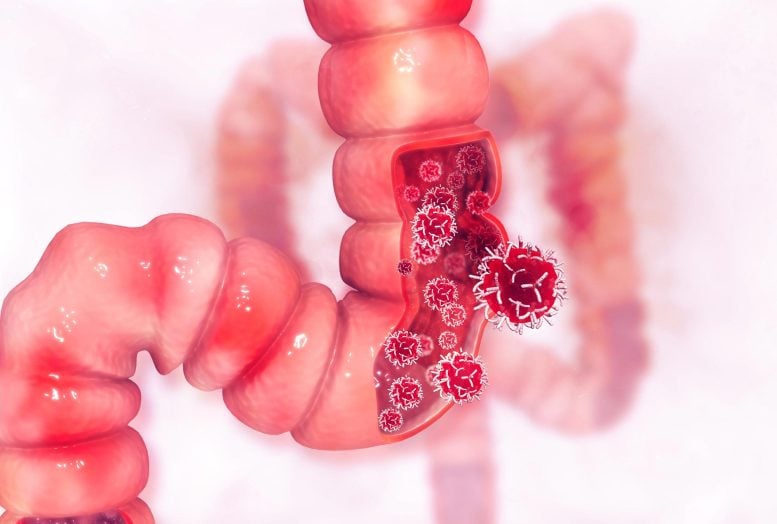
Scientists at UNIGE have created an artificial intelligence method that can diagnose colorectal cancer by analyzing the gut microbiota.
Colorectal cancer ranks as the second most common cause of cancer-related deaths worldwide. When caught early, it can usually be treated effectively, but the expense and discomfort of colonoscopies, the standard diagnostic procedure, often delay detection. Researchers at the University of Geneva (UNIGE) have now taken a major step forward by using machine learning to map all human gut bacteria at an unprecedented level of detail, allowing them to better understand the physiological role of different microbial subgroups.
This comprehensive catalog was then applied to identify colorectal cancer through the bacterial signatures found in simple stool samples, offering a non-invasive and affordable alternative to traditional methods. The approach also has wide potential applications, from detecting other cancers to advancing knowledge of how gut microbiota influence health. The results were recently published in Cell Host & Microbe.
Colorectal cancer is frequently diagnosed only after it has progressed to advanced stages, when treatment options are limited. This highlights the urgent need for easier and less invasive screening tools, especially given the puzzling increase in cases among younger adults. Although scientists have long known that gut microbes influence the development of colorectal cancer, applying this knowledge in clinical practice has been difficult. One reason is that different strains within the same bacterial species can act very differently—some may contribute to the disease, while others appear harmless.
“Instead of relying on the analysis of the various species composing the microbiota, which does not capture all meaningful differences, or of bacterial strains, which vary greatly from one individual to another, we focused on an intermediate level of the microbiota, the subspecies,” explains Mirko Trajkovski, full professor in the Department of Cell Physiology and Metabolism and in the Diabetes Centre at the UNIGE Faculty of Medicine, who led this research. “The subspecies resolution is specific and can capture the differences in how bacteria function and contribute to diseases including cancer, while remaining general enough to detect these changes among different groups of individuals, populations, or countries.”
With the help of machine learning
The first step was to analyze huge amounts of data. “As a bioinformatician, the challenge was to come up with an innovative approach for mass data analysis,” recalls Matija Trickovic, PhD student in the laboratory of Mirko Trajkovski and first author of this study. “We successfully developed the first comprehensive catalogue of human gut microbiota subspecies, together with a precise and efficient method to use it both for research and in the clinic.”
By combining this catalogue with existing clinical data, the scientists developed a model that can predict the presence of colorectal cancer solely based on the bacteria present in stool samples. “Although we were confident in our strategy, the results were striking,” enthuses Matija Trickovic. “Our method detected 90% of cancer cases, a result very close to the 94% detection rate achieved by colonoscopies and better than all current non-invasive detection methods.”
By incorporating additional clinical data, the model has the potential to become even more accurate, approaching the reliability of colonoscopy. It could serve as a routine screening method, allowing early cases of colorectal cancer to be identified, with colonoscopies then used only to confirm the diagnosis in a smaller, targeted group of patients.
A new world of applications
A first clinical trial is being set up in collaboration with the Geneva University Hospitals (HUG) to determine more precisely the cancer stages and the lesions that can be detected. However, the applications go beyond colorectal cancer. By studying the differences between subspecies from the same bacterial species, researchers can now identify the mechanisms of action by which the gut microbiota influences human health.
“The same method could soon be used to develop non-invasive diagnostic tools for a wide range of diseases, all based on a single microbiota analysis,” concludes Mirko Trajkovski.
Reference: “Subspecies of the human gut microbiota carry implicit information for in-depth microbiome research” by Matija Tričković, Silas Kieser, Evgeny M. Zdobnov and Mirko Trajkovski, 13 August 2025, Cell Host & Microbe.
DOI: 10.1016/j.chom.2025.07.015
Never miss a breakthrough: Join the SciTechDaily newsletter.
3 Comments
Then, they can learn to skip that too, and use a swamp to check what plants grow there without carcinogens, to spot clusters of cancer.
While this is good news, is it or will it be available in the US?
While this is great news, is it or will it be available in the US?